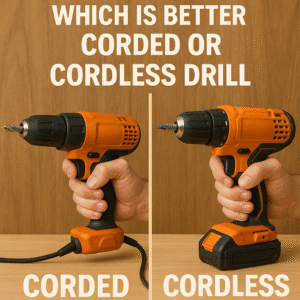Corded vs. Cordless Drill: The Ultimate Showdown (2025 Guide)
You’re standing in the tool aisle, staring at a wall of drills. On one side, the corded veterans—reliable, powerful, and tethered to the wall. On the other, the sleek cordless contenders, promising freedom and flexibility. It’s a classic DIY dilemma, and I’ve been there more times than I can count. As someone who’s spent the last 15 years building everything from decks to custom furniture, I’ve burned out, cherished, and relied on both types of drills.
I remember the frustration of running just short of an outlet with a corded drill while perched on a ladder. I also remember the sinking feeling of a cordless battery dying right in the middle of a critical task. This guide is the culmination of that experience. We’re going to cut through the marketing jargon and settle the debate, helping you choose the right drill for your projects, not the one the box store wants to sell you.
The Quick Verdict: Which Drill Should You Buy?
Let’s not bury the lead. You came here for an answer, so here’s the short version based on years of hands-on use:
Go Cordless If…
You’re a homeowner, a DIY enthusiast, or need a versatile tool for general tasks. The sheer convenience and portability for jobs like assembling furniture, hanging shelves, or working in the yard make it the undisputed champion for 90% of users today.
Go Corded If…
You’re a serious woodworker, a contractor, or your projects involve relentless, heavy-duty tasks. For jobs requiring maximum, uninterrupted power—like drilling into concrete, mixing mortar, or running large hole saws all day—a corded drill is an indispensable workhorse.
Now, for the details that really matter. Let’s dive deep into the head-to-head comparison.
The Head-to-Head Comparison: 6 Factors That Matter
Choosing a drill isn’t just about the cord. It’s a balance of power, runtime, ergonomics, and cost. Let’s break it down feature by feature.
1. Power & Torque: The Heart of the Drill
This is the most misunderstood aspect of drills. Power isn’t just one number; it’s a combination of factors.
- Corded Drills: Power is measured in Amps. A higher amp rating (e.g., 7-10 Amps) means the motor can handle more load without overheating. They deliver consistent, high-torque power as long as they’re plugged in. They are the kings of sustained, heavy-duty applications.
- Cordless Drills: Power is a function of Volts (V) and the resulting Torque (measured in inch-pounds, or in-lbs). Higher voltage (18V-20V is the standard for serious work) generally means more power. Modern brushless motors have made incredible strides, delivering torque that can rival some corded models, but they can’t sustain that peak output indefinitely like a corded drill can.
Understanding what is the power rating of a drill machine is crucial. It’s the difference between effortlessly driving a 3-inch screw and stripping the head because the tool just couldn’t keep up.
2. Portability & Convenience: Freedom vs. The Leash
This is the easiest category to judge. A cordless drill wins, hands down. The ability to grab your drill and go—whether it’s up a ladder, into the attic, or out in the backyard—is a game-changer. You’re not searching for an outlet or fighting with tangled extension cords. For quick jobs and general home maintenance, this convenience is often the deciding factor.
3. Runtime & Battery Life: The Achilles’ Heel
While cordless drills offer freedom, it comes at a price: runtime. A corded drill runs forever. A cordless drill runs until the battery dies. Modern Lithium-Ion (Li-ion) batteries are lightyears ahead of old Ni-Cad tech, but they still have limits.
My pro tip: If you go cordless, always invest in a second battery. Always. Having one on the charger while you work is non-negotiable for any project that takes more than 30 minutes.
4. Weight & Ergonomics: The Feel in Your Hand
Historically, corded drills were lighter because they don’t have a heavy battery pack. However, modern cordless drills with brushless motors and compact batteries are incredibly well-balanced and ergonomic. A heavy battery can actually help counterbalance the front of the drill, reducing wrist strain. This category has become less of a deciding factor and more a matter of personal preference.
5. Durability & Lifespan: Built to Last?
Corded drills are mechanically simpler. They have fewer complex electronic components, and their motors are often built for continuous abuse in a workshop setting. A good corded drill can easily last a decade or more with minimal maintenance. Cordless drills have more points of failure: the battery, the charging port, the complex electronics. That said, a high-quality brushless cordless drill from a reputable brand is a very durable tool designed for professional job sites.
6. Cost: Upfront vs. Long-Term
Upfront: A powerful corded drill is often cheaper than an equivalent-quality cordless drill kit (which includes batteries and a charger).
Long-Term: The calculus changes. The main long-term cost of a cordless tool is battery replacement. Li-ion batteries have a finite lifespan (typically 3-5 years or a certain number of charge cycles). This is a hidden cost many first-time buyers forget.
| Feature | Cordless Drill | Corded Drill |
|---|---|---|
| Power | Excellent, high torque (Volts/in-lbs) | Maximum, sustained power (Amps) |
| Portability | Unbeatable. Use anywhere. | Limited by cord length. |
| Runtime | Limited by battery life. | Unlimited. |
| Best For | General DIY, construction sites, quick jobs. | Workshop use, masonry, heavy-duty mixing. |
| Cost | Higher initial kit price; long-term battery cost. | Lower initial price; no long-term costs. |
Expert Picks: My Go-To Drills for the Job
Theory is great, but what tools do I actually reach for in my own workshop? Here are my top recommendations available on Amazon, based on years of personal use and testing.
Top Cordless Pick: The Do-It-All Champion
For the vast majority of tasks, from building a deck to just hanging a picture frame, a modern brushless cordless drill is the answer. This is the category where I believe it’s worth investing in a quality tool that will last. Learning how to use a drill machine for home improvement is much easier when you have a reliable, user-friendly tool in your hands.

Expert Pick: DEWALT 20V MAX XR Brushless Drill/Driver
This isn’t just a drill; it’s the heart of a massive tool ecosystem. The brushless motor is incredibly efficient, delivering more power and longer runtime from the battery. It’s compact, comfortable to hold, and has enough power to tackle 99% of household jobs. I’ve personally used this model to build furniture, install cabinets, and even drill through thick pressure-treated lumber for a pergola. It has never let me down.
Check Price on AmazonTop Corded Pick: The Unstoppable Workhorse
Sometimes, you just need raw, unapologetic power. When I’m facing a day of drilling into brick, using a 4-inch hole saw, or mixing a bucket of thin-set mortar, I don’t even think about a cordless. I grab the corded beast.

Expert Pick: DEWALT DWD210G 10-Amp Pistol Grip Drill
This drill is a monster, and I mean that as the highest compliment. The 10-Amp motor provides overload protection and won’t bog down under heavy load. The 1/2-inch all-metal chuck is durable and grips bits securely. It’s heavy, it’s loud, and it feels like it could drill through a bank vault. It’s the definition of a special-purpose tool, and for heavy-duty jobs, it’s absolutely essential.
Check Price on AmazonThe Final Verdict: Making Your Choice
So, where do you land? The choice is simpler than you think. Assess your most common projects. Be realistic about what you’ll be doing 80% of the time.
If you’ve decided that freedom and versatility are your top priorities, your journey starts with picking the right model. We’ve compiled an in-depth guide to the very best cordless drills currently on the market, covering options for every budget and need.
However, if your workshop demands raw, unrelenting power and you can’t afford to be at the mercy of a battery, don’t miss our comprehensive review of the best corded drill options that will never let you down.
Ultimately, the best drill is the one that fits your life. For most people today, that’s a high-quality 20V brushless cordless model. But for the power users among us, a corded drill isn’t obsolete—it’s essential.
Frequently Asked Questions (FAQ)
What does “brushless” mean and is it worth the extra cost?
A brushless motor is more advanced than a standard “brushed” motor. It’s digitally controlled, which makes it more efficient. Yes, it is absolutely worth it. You get longer battery life (up to 50% more), more power, and a longer tool lifespan. For any drill you plan to use regularly, go brushless.
Can a cordless drill go through concrete?
Most standard cordless drills can’t. For concrete or brick, you need a drill with a “hammer drill” function. Many high-end cordless models come as “hammer drill/drivers,” which are very effective for occasional masonry work. For frequent concrete drilling, however, a corded hammer drill or a dedicated rotary hammer is still the superior tool.
How many volts do I need in a cordless drill?
For general home use, 18V or 20V MAX is the sweet spot. These drills offer the best balance of power, weight, and battery life. 12V drills are great for light-duty tasks like assembling IKEA furniture, but they may struggle with more demanding jobs. Anything above 20V is typically overkill for a non-professional.


